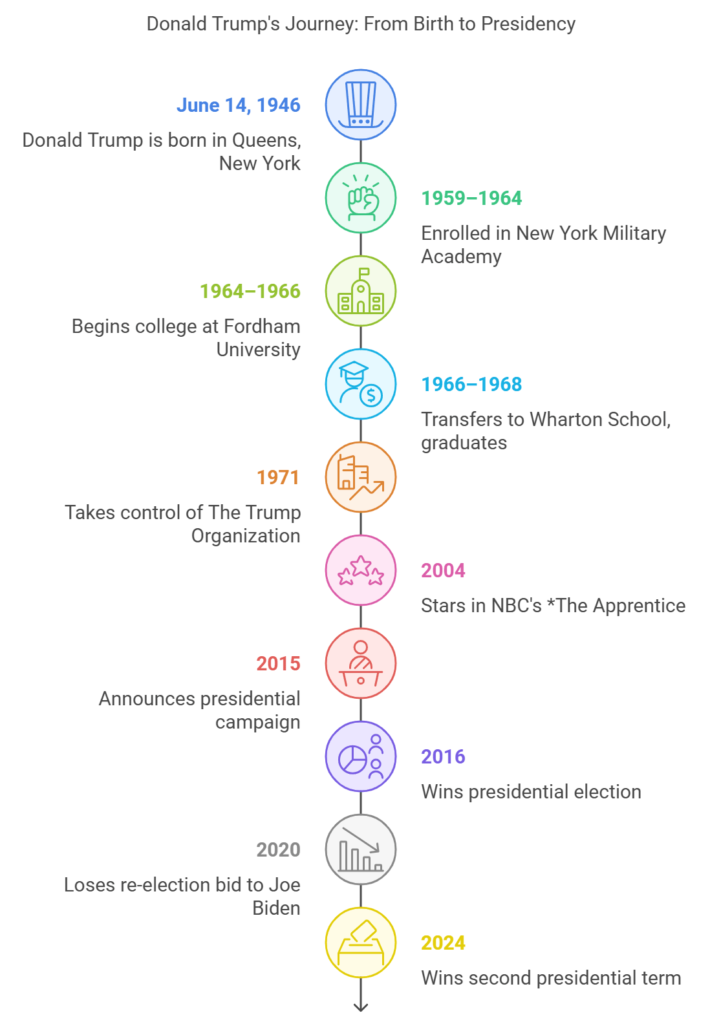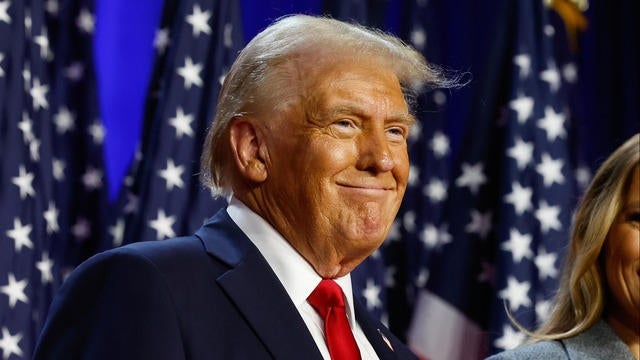Donald Trump won the 2024 U.S. presidential election, defeating Vice President Kamala Harris. His win has marked his return to the White House as the 47th president. Throughout his campaign, Trump focused on issues like economic struggles, immigration reform, and tapping into discontent in economically struggling regions. His victory signals significant changes in U.S. domestic and foreign policy, and his new administration is expected to advance an agenda similar to, but more aggressive than, his previous term
Donald Trump’s educational background and upbringing played a significant role in shaping his approach to leadership, risk-taking, and his eventual success in business and politics
Trump’s Road To Success
Early Life and Family Influence

Parental Influence
Born in 1946, Donald Trump was raised in a wealthy family with a strong emphasis on business and a relentless work ethic. His father, Fred Trump, was a successful real estate developer in New York, and from a young age, Donald was immersed in the family’s operations. Fred Trump’s influence encouraged a competitive spirit in his son, teaching him the ins and outs of the real estate industry and instilling values of resilience and resourcefulness.
Mother’s Influence
Donald Trump’s mother, Mary Anne MacLeod Trump, also played a significant role in his upbringing. She supported traditional family values and was actively involved in the family, helping to instill confidence and reinforce discipline in Donald and his siblings. This balanced upbringing, with both a father who championed a driven, risk-taking mentality and a mother who fostered stability and personal growth, would later manifest in Trump’s multifaceted leadership style.
Education Path
New York Military Academy (1959-1964)
Due to disciplinary issues at his previous school, Trump’s parents enrolled him in the New York Military Academy (NYMA) when he was 13 years old. This environment proved to be a transformative experience for the young Trump. At NYMA, he thrived, gaining valuable discipline and leadership experience. The structure, competitiveness, and emphasis on authority that characterized the military school would later inform Trump’s no-nonsense, often combative approach to problem-solving and decision-making.
Fordham University (1964-1966) and the Wharton School of Business (1966-1968)
After his time at NYMA, Trump attended Fordham University for two years before transferring to the prestigious Wharton School of Business at the University of Pennsylvania. At Wharton, Trump studied economics and finance, building on the real estate skills he had learned from his father. The rigorous curriculum and competitive environment at Wharton likely sharpened Trump’s business acumen, equipping him with the analytical tools and strategic thinking that would prove invaluable in his future endeavors.
Early Business Lessons and Success
Upon completing his education, Trump joined his father’s real estate business, applying the lessons he had learned at Wharton and the disciplined approach he had developed at the military academy. He took calculated risks, initially working on smaller deals before gradually expanding into larger, high-profile projects.
Fred Trump’s early guidance, particularly in the realms of finance and negotiation, enabled Donald to leverage debt creatively, a skill he would later utilize to expand his real estate empire and build his brand. This ability to navigate complex financial structures and negotiate favorable terms would become a hallmark of Trump’s business strategy, contributing to his overall success.
Impact on His Political Success
Trump’s upbringing and education imbued him with a competitive spirit and resilience that would prove instrumental in his political career. His early exposure to real estate negotiations and branding strategies equipped him with the tools to run effective campaigns and connect with voters, drawing on his strong, authoritative style.
Additionally, his experience in high-stakes business environments prepared him to handle public scrutiny and setbacks, qualities that resonated with a base of voters looking for an “outsider” in the political arena. Trump’s background as a successful businessman, rather than a career politician, allowed him to position himself as a political disruptor, appealing to those who were disillusioned with the status quo.
Conclusion

Through a mix of family influence, rigorous education, and early career training, Donald Trump developed the resilience, strategic thinking, and competitive edge that later helped him rise to power in both the business and political worlds. His ability to leverage his unique background, combined with his unwavering determination and savvy communication skills, ultimately propelled him to a second term in the White House, solidifying his legacy as one of the most unconventional and influential political figures of the modern era.

